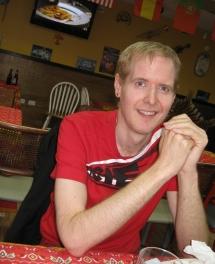It wasn’t the way Tamara Donkersgoed wanted to remember her friend: looking for his discarded belongings in the bottom of a dumpster.
But there she was, in early October, sifting through garbage to find Brent Astle’s books, photos, DVDs and paintings that were thrown out by his family apparently for containing gay content.
Donkersgoed and her wife, Dawn, had gone to Astle’s New Westminster home to meet his family, strict Mormons from Kamloops whom they had never met, to tell them what a giving and caring son they had recently lost.
The women were shocked when they arrived. The family was gone, and “anything of value that was not gay was boxed up and taken,” while the rest was thrown in the dumpster, Donkersgoed alleges.
“After some time, we just became numb…. They had taken the time to separate the recycling but not enough time to do the right thing with his belongings.”
Astle, 39, killed himself on Sept 30, presumably unable to cope with years of familial alienation due to his homosexuality.
According to Dawn Donkersgoed, when she met Astle in June 2008 he was still struggling and coming to terms with being gay and what that meant to his family.
“The family pushed him out of their lives. They only tried to contact him to send him religious things and spiritual things,” she alleges. “His sister said to him at one point, ‘You can be gay but you can never have sex with a man.'”
Astle’s parents say they had a good relationship with their son.
“We accepted Brent and we gave him unconditional love,” says his mother Sheila.
“The family loved him and we always reached out to him,” she adds. “We never pushed religion on him.”
“He was a good son and we loved him dearly and we miss him,” says his father Rodney. “We always had contact with him… He was always good to us.”
Donkersgoed says Astle reached out to her earlier this year after he tried but failed to commit suicide. “I tried to do some things to get him connected – and I guess it just wasn’t enough.”
To the people he worked with, Astle was a high achiever, Donkersgoed says. One month into his first semester of a master’s degree in social work at UBC, Astle also worked in the Vancouver Addictions Matrix Program at Three Bridges Community Health Centre.
“I remember he said to me: most people who get into social work get into it to solve their own problems,” Donkersgoed recalls.
“We were really close. We were pretty much soul mates, in a sense.”
The number of reported suicides by gays, particularly gay youth, has risen noticeably in the past several weeks. Since Sept 9, almost a dozen have been widely reported by North American media.
The apparent surge in suicides has inspired some well-known figures to share their own coming-out stories and words of support. Dan Savage’s It Gets Better campaign exceeded YouTube’s channel capacity in its effort to convince gay youth that life improves after high school.
Though it was as an adult that Astle committed suicide, Tamara Donkersgoed says she hopes her friend’s story will encourage others in similar situations to reach out for help.
“It’s so important to know that your bio family is not the only family, and not always the family that supports you,” she says.
Ryan Clayton, a 22-year-old gay activist in Vancouver, wants to highlight the support that already exists and create more.
“Qmunity offers a range of programs including free counselling,” he notes.
Clayton, who volunteers as a facilitator with Out In Schools and sits on the city’s gay advisory committee, is organizing a candlelight vigil for Oct 20 to remember those who have committed suicide and discuss services available to those who may be struggling.
The vigil was slated to be held at the Davie Village Community Garden but had to relocate due to more than 350 confirmed attendees on Facebook. It will now be held in Emery Barnes Park at Davie and Richards St.
Clayton says he organized the event because “it seemed like there wasn’t anything happening in response to [the suicides].”
He wants to send a message of hope to the community.
“What they’re looking for is not a get-together to light candles and feel sad. They’re looking to get together and do something about this,” he says.
“Why don’t we give them an opportunity, sort of like a networking event, where speakers talk about the seriousness of suicide, here’s what we’re doing about it, and here’s how to get involved.”
Oct 20 coincides with Wear Purple Day, where some 20,000 people across North America have committed to wearing the rainbow flag’s “spirit” shade in memory of those who committed suicide.

 Why you can trust Xtra
Why you can trust Xtra


